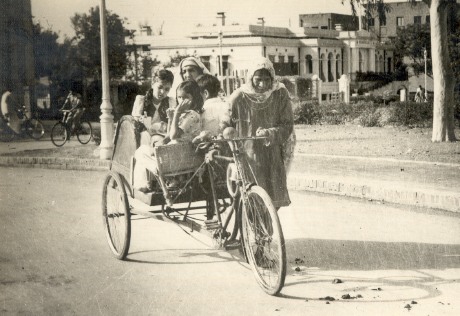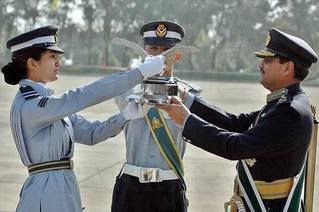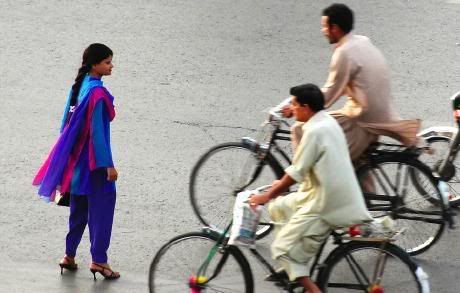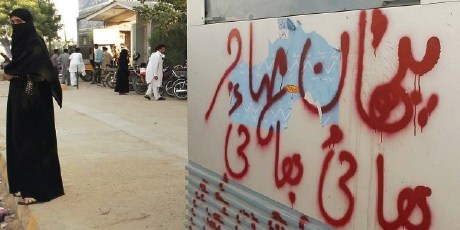Mehr Un Nisa
As much as I’m proud of my culture, the unnecessarily sharp lines drawn between the roles of men and women, is something I can never imagine myself defending. And no matter how liberal an environment you’re living in, the distinction keeps on surfacing in ways that are almost imperceptible.




Petty example: Have you ever noticed how the Director Security at every big event or conference is invariably a male? “Come on, it IS a guy’s job – you can’t make a fuss about that now”, if these aren’t the first words coming to your mind after reading the example, we’re friends.
A more interesting observation that says much about the status of technical training in Pakistan as well as where we stand with respect to the progressive ideals we claim to have is the following: we have absolutely no professional female maintenance workers in Pakistan. It is not unusual for a girl to be kicked out of her room where repair work is to be done, with this innocuous statement, “Baji, aadmi aye hain kaam kernay.”
It leaves you wondering whether the idea of a female plumber, electrician or a carpenter is really as ridiculous as some people would have you believe? What is it in wiring some circuits, basic plumbing or fixing a cable that requires a man’s strength? Women do these jobs in so many countries in the world, after all.
So, why not in Pakistan? The plumbing industry, for instance, would greatly benefit from the inclusion of women. Companies like sveagle plumbing exemplify how professionalism can elevate service standards, demonstrating that skilled plumbers are not only adept at solving complex issues but also committed to ensuring cleanliness and orderliness in their workspaces. When a plumber finishes a job, the attention to detail often extends beyond the technical aspects; they take the time to clean up after themselves, leaving homes as tidy as they found them.
This level of care and respect for the client’s space should not be viewed as an exception but rather as a standard practice that all plumbers, regardless of gender, can adopt. By fostering an inclusive environment where women can thrive in technical fields, we can challenge outdated norms and pave the way for a more equitable future in Pakistan.
Read Full Post
Adil Najam
Once again, Karachi is gripped in a wave of ethnic violence and ‘target killings.’ In a city still reeling from the dastardly attacks on the shrine of Sufi saint Abdullah Shah Ghazi, the daily grind of senseless by targeted violence has once again peaked in the context of the bye-elections for PS-94, some 28 Karachites already lie dead and all indications suggest that the human as well as the political toll will end up being much higher.

The details of what has been happening are developing fast, constantly changing, essentially horrid, and well known to all. But here are the essentials: the ‘normal’ (what a horrid term that is in this context) level of targeted killings in Karachi has been rising the last many days, especially in the run-up to the PS-94 bye-elections; yesterday ANP announced it would boycott that election; the violence has escalated even further with that news; and now with the elections having been decided in MQM’s favor, the MQM is threatening to leave the coalition and Governor Sindh is now in Islamabad ready to meet President Zardari sometimes tonight on this. As workers and supporters – invariably, the poorest and already most vulnerable of Karachi’s citizens – from both parties fall in what continues to be ‘played’ as an ethnic clash as much as a political one, the only thing that ANP and MQM can seem to agree on is that the PPP is to blame.
Read Full Post
Salahuddin Khan
 On Pakistan’s already beleaguered economy, the added pressures of the recent floods are estimated to have created $10 billion of additional damage-related burden. It will likely cost double that amount if we’re to see more than simple replacement of the old buildings, farmlands and infrastructure and use the opportunity to rebuild the country leveraging all that we can in modern, cost effective technology. The disaster could thus be seen at least with some silver lining.
On Pakistan’s already beleaguered economy, the added pressures of the recent floods are estimated to have created $10 billion of additional damage-related burden. It will likely cost double that amount if we’re to see more than simple replacement of the old buildings, farmlands and infrastructure and use the opportunity to rebuild the country leveraging all that we can in modern, cost effective technology. The disaster could thus be seen at least with some silver lining.
To be sure the international community has promised much, though much of what’s been promised has also to be delivered. Nonetheless that figure, if collected, would be barely 5% of what’s needed, given the truly vast scale of the devastation.
For these and other reasons, Pakistan has proceeded cap-in-hand to the IMF for additional assistance and as usual, IMF money comes with harsh strings including the abolition of energy subsidies and reform of the General Sales Tax.
But with barely three percent of its population paying taxes and its most wealthy escaping taxes more than in most countries around the world, Pakistan has to be close to the head of the pack in needing significant revenue reform. The recent floods simply serve to highlight the unacceptability of this situation and glowing with empty pride about being the “Land of the Pure” while over half the population is doing everything in its power to ignore or pay off the taxman with bribes, is hardly the way forward. We have no basis for national pride in the face of such behavior.
So what can be done to advance the state of affairs, and more particularly, how can we leverage the new momentum of national unity to repair our ravaged country?
Here’s a potential thought, with apologies for not recognizing anyone else who may have offered the same opinion either here or in other public media. What if we were to abolish all income tax and in its place introduce a gradually increasing property tax on real estate owned?
Read Full Post





























































